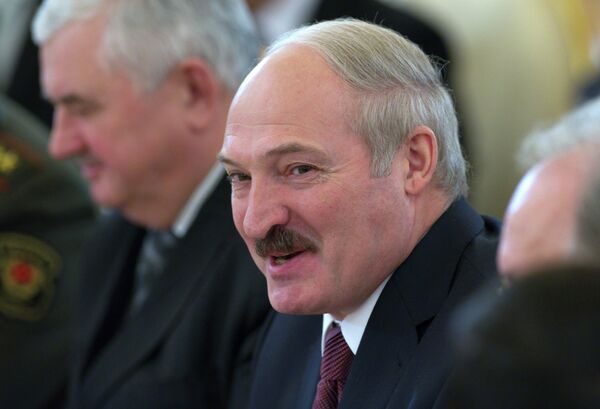It is clear that the December 19 presidential election will not change anything in Belarus. Although the opposition candidates were given an opportunity to make television addresses to the people, the authorities still have tight control over polling stations, absentee voting and other parts of the election system. Their victory is assured.
A voter rally organized by the opposition is planned for the evening of December 19 to contest Lukashenko's essentially inevitable victory. But the powers-that-be will stop at nothing to keep the rally from happening.
The limit on revolutions
On December 15, President Alexander Lukashenko met with the heads of his security agencies, including Interior Minister Anatoly Kuleshov, KGB chairman Vadim Zaitsev and Defense Minister Yuri Zhadobin. He asked them what steps the opposition might take if it decides to challenge the election results.
The opposition in Belarus has been accused of provoking the police to use force against protesters. Shocking images of police dispersing demonstrators with clubs are then aired on Western news programs, garnering sympathy and support for the opposition. This is a traditional accusation going back to Soviet times.
Surprisingly, it was not the KGB chairman but President Lukashenko's chief of staff, Vladimir Makei, who warned about the enemy's plot. "They are preparing groups of militants and buying warm clothes, pyrotechnical devices and even explosives," he said.
In a futile effort to prevent a demonstration, the authorities have turned the main square in the capital of Minsk, October Square, into a huge outdoor skating rink with a New Year tree in the middle. They also expect weather to come to their aid: temperatures are expected to drop below 18 decrees Celsius on election day. Riot police and other police units are preparing to block all streets leading to the square to prevent the demonstration.
A week before Lukashenko's meeting with his top security officials, the president clearly expressed his intention to remain in power.
He said in an address to parliament, "No matter where you meet and what you do, you will not get the country. We will not let you tear it apart, because we have paid a high price for it ... Those who are dreaming of a revolution should calm down: we reached our limit on revolutions last century."
Readers who are unfamiliar with politics in Belarus might hear this as intimidation, but this is just Lukashenko's usual style. By referring to the opposition as "you," he creates an image of the opposition as faceless enemies against which any and all means are justified.
The older generation will tell you that similar veiled phrases ("their mores," "some circles") were used to refer to foreign opponents during the Soviet era.
The limit on high-handedness
Belarus and all other post-Soviet countries may have reached their limit on revolutions. But the Belarusian president should also know that he has nearly reached his limit on high-handedness in international and, to some extent, internal affairs.
The Belarusian economy needs Russian and EU benevolence to survive, but police clubs and groundless accusations about Russian "oligarchs" do not inspire benevolence. This is why Lukashenko has channeled Sun Tzu to deal with a possible demonstration on election day: win the battle before it is even fought. This time the Belarusian security services will only use clubs, helmets and dogs as a last resort.
The Belarusian leader has also tried to pair brute force with diplomacy. He recently restored relations with his Russian counterpart, Dmitry Medvedev. He also met with American analysts, thus extending an olive branch to the United States, which makes no attempt to hide its disdain for Lukashenko.
He has also promised Polish, Lithuanian and German officials that the election will be "the most democratic in Europe."
By resorting to force against the opposition, Lukashenko would lose face even in the eyes of forgiving Belarusian TV viewers.
Will the opposition lose again this time? Yes, very likely, but that does not mean that it will never win.
A good deed never goes unpunished
Opposition candidate Nikolai Statkevich jabbed the regime's sore spot during his recent Internet video address to the Belarusian security services. He reminded them of the inglorious fate of the security officers who fulfilled Lukashenko's "delicate" orders in the past.
Statkevich spoke about the disappearance of Lukashenko's critics in the 1990s, which the Russian president also mentioned in his video blog. Many people rumored to be involved in their disappearance have themselves disappeared or are now behind bars.
There is also the example of Stepan Sukhorenko, a former KGB chairman who ordered post-election opposition demonstrations to be broken up in 2006 and accused the opposition of destabilizing the country, just as Vladimir Makei did during his meeting with Lukashenko. A year later, the "man who prevented the dissolution of the country" was fired and could not find a job for a year, until his appointment as Belarusian ambassador to Armenia.
The situation in Belarus will change radically only when a critical mass of the Belarusian elite grows tired of being pawns in the president's game, and when an opposition candidate offers a real economic and foreign policy program that involves cooperation with both the EU and Russia.
Vladimir Nekliaev, a member of the Belarusian Helsinki Committee's Observation Council, made it closer to this goal than any other candidate. But he has a conservative attitude toward integration with Russia. Maintain the status quo.
Only a candidate who charts out a clear path forward will win in Belarus.
The views expressed in this article are the author's and do not necessarily represent those of RIA Novosti.



